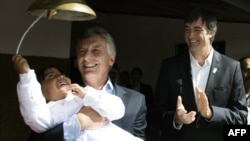Argentine President Mauricio Macri's favored candidate is gaining ground against former populist leader Cristina Fernandez in a closely watched Senate race in the country's largest province of Buenos Aires, sources from both parties and two analysts said.
Macri's former education minister Esteban Bullrich of his Let's Change coalition appears to have reversed the trend since last month when Fernandez narrowly beat him by 0.08 percentage points in a nonbinding primary vote.
While a second-place finish would still guarantee Fernandez a Senate seat, the number of votes she gets is being closely watched by investors who see the October 22 vote as a gauge of her potential to stage a comeback in the 2019 presidential election.
Analyst Ricardo Rouvier has not finished his latest poll but estimated that Bullrich was leading Fernandez by about 3 percentage points in Buenos Aires province, home to nearly 40 percent of Argentine voters.
"Cristina has a large number of votes, but she is stuck there, she has a ceiling," he said in an interview. Fernandez's 2007 to 2015 presidency saw Latin America's No. 3 economy cut off from international capital markets and several companies nationalized. Fernandez was indicted for corruption last year, though she dismisses the charges as politically motivated. A seat in Congress would give her immunity from arrest though not from trial.
"We have registered our growth in the polls," said a high-level government source who asked not to be identified.
Citizen's Unity, the party Fernandez founded before launching her candidacy in June, confirmed the trend but said Bullrich had a smaller lead.
"What we have is an advantage of half a percentage point [for Bullrich]; we have a tied election again," said a campaign spokesman who declined to be named.
A representative for another Argentine pollster, who asked not to be identified because the firm is currently only surveying for private clients, said Bullrich has a four percentage point lead over Fernandez.
The polarized show-down between Fernandez, who says Macri's economic austerity has hurt the provincial poor, and Bullrich has largely left out other parties and moderate candidates.
Fernandez broke with Peronism, Argentina' best-known political movement, for the election and her former transportation minister Florencio Randazzo attracted few votes in the primary.
Sergio Massa, a presidential candidate in the 2015 election against Macri, finished a distant third behind Fernandez. Seeking to unify the opposition against Bullrich, Fernandez on Monday published a letter on Facebook asking for the support of those who did not vote for her.
"We hope that the Peronist voters who accompanied proposals such as Randazzo or Massa join this majority," said Jorge Taiana, Fernandez's former foreign minister and senate candidate, in an interview.
The Citizen's Unity spokesman said the party is in talks with Peronist mayors who support Randazzo to try to convince them to back Fernandez. Four have switched over and the party has high hopes for three more, he said.
No matter how many seats his coalition picks up in October - when Argentines elect one-third of the Senate and half the lower house of Congress - Macri will still lack a majority and will need to negotiate tax and other reforms he hopes to pass in the second half of his term.





